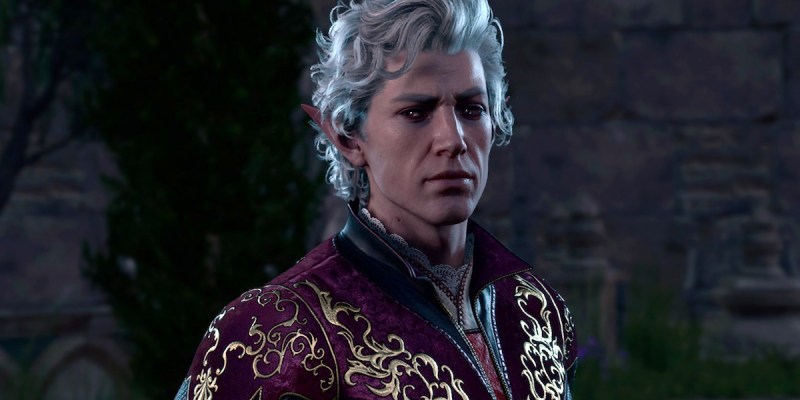Warning: The following interview with Neil Newbon about Astarion in Baldur’s Gate 3 contains spoilers for the game.
During my introduction to Astarion, a scene in which he attempted to hold my character at knifepoint, falsely accused her of being in league with the mind flayers who’d captured him, and then still had the audacity to drop a line like, “Is that so? We clearly move in different circles” when discovering they both hailed from Baldur’s Gate, I was immediately certain that one of two things would happen over the course of my Baldur’s Gate 3 playthrough: I would eventually despise Astarion to the degree that I’d be contemplating murder every time he spoke…or I’d fall completely in love with him.
It probably goes without saying that the latter option is what transpired — Astarion quickly became a cherished companion and joined the likes of Midna (The Legend of Zelda: Twilight Princess) and Yuri (Fire Emblem: Three Houses) in my personal pantheon of beloved video game characters, almost all of whom are cunning, puckish personalities who keep their cards close to their chests, lest anyone realize their hearts are softer than they’ve been letting on.
I was delighted to have the opportunity to speak with Neil Newbon, who portrayed Astarion in Baldur’s Gate 3, about the process of crafting his incredible character. In this interview, he discusses acting techniques, sources of inspiration, aspects of Astarion’s story that he relates to, post-launch impressions of the game, and more.
Related: Baldur’s Gate 3 – Zero Punctuation
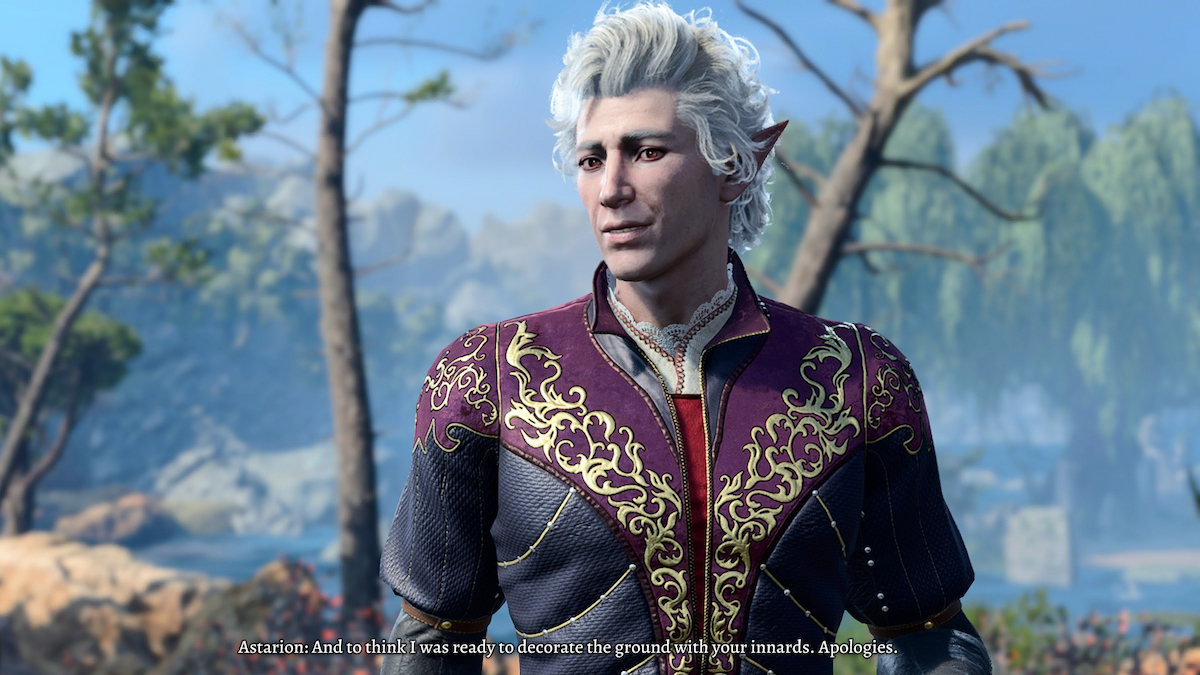
Who Is Astarion? A Brief (Auto)-Biography
There’s something fascinating about listening to an actor synopsize their own character, especially when the traits they deem fundamental or noteworthy aren’t necessarily among the first things a general audience would think of. For example, Samantha Béart described Karlach as “emotionally stunted” — a conclusion that a casual Baldur’s Gate 3 player might not reach on their own, but someone with a deeper investment in Karlach’s narrative might see as a crucial component of her identity.
After providing an overview of Astarion’s background — how he was turned into a vampire spawn and spent two miserable centuries living as Cazador’s slave — Newbon offered his assessment of the high elf rogue and former magistrate’s personality.
“He was probably quite decadent in the past, perhaps abusing his power a little bit. I see him as being very intelligent — very erudite — and highly manipulative when he wants to be. Very vulnerable and traumatized, but also incredibly witty and funny. He’s got etiquette, he’s articulate, and he’s very sophisticated. He’s a lover of the arts without, I believe, having the talent to produce art himself. He’s also rather good-looking, and he’s not afraid to use that as a way to shield himself or to get what he wants. He’s immoral, not amoral. I would say he’s quite aware of morality. He just chooses not to [be moral], darling, you know?” he said, a hint of Astarion’s inflection breaking through on the words “chooses” and “darling.”
“His sense of freedom is the most powerful thing about him,” he continued. “The drive to be free — the need to be free at all costs, including things that are morally gray and sometimes completely wrong. But the overriding sense is never wanting to be trapped again in a situation like the one he’s come from for the last 200 years. Underneath all of that, if you can find a way to him, he’s also probably one of the best friends you’ll ever have.”
I then asked Newbon how he believes Astarion would describe himself, a question he opted to respond to while acting as Astarion. “Why not, darling? It’s sort of creeping into my voice anyway,” he said. “I am unique amongst people. I see myself with great clarity when others lie about themselves. I know who I am, and I know what I want, and that’s freedom at all costs. Now, if people get in the way of that…that’s their business. A tadpole in my head seems to be driving me towards destruction. Well, if that’s to be my end, at least I’m going to have a bloody good time doing it!”
He paused for a moment, seemingly reflecting on the impromptu performance he’d just given. “It’s funny, I haven’t been asked that question before. How does he see himself?” he mused. “I know how I see him. In the script, he does see himself in certain ways, but he’s always very, very guarded about it. He’s always careful not to give too much away because if he does that, then he starts losing power and can theoretically be manipulated. So, it’s a very interesting situation for him to regard himself openly like that.”
Related: Best Berserker Barbarian Build in Baldur’s Gate 3
What stood out to me, both in Newbon’s initial response and when he was answering from Astarion’s point of view, was the emphasis on Astarion’s awareness of his own immorality. The accentuation on choosing not to take the honorable route, the almost defensive steeliness underlying “freedom at all costs,” and the exaggerated nonchalance of “that’s their business” all highlight one subtle but important facet of Astarion’s character — that partially manufactured air of aloofness he works so hard to maintain betrays the fact that he does care what people think, at least when it comes to those he’s beginning to respect or grow fond of. Since he expects people to pass judgment on him, he lessens the impact of their eventual disapproval by immediately acknowledging — and embracing — the fact that he’s not above using wicked means to achieve his ends.
If there’s one person who can honestly say he’s never criticized Astarion’s less-than-exemplary conduct, it’s Neil Newbon. In fact, immoral and morally complex characters are often his favorites to play. “I never see [my characters] as heroes, villains, anti-heroes, or whatever. I love my characters, so I never really judge them for anything,” he said. “One thing with playing a ‘villain’ role or an ‘anti-hero’ role is that you’re genuinely unshackled by the same kind of morality that the hero has to abide by. The anti-hero can do bad things in the name of a good thing, for instance. They can be more laterally developed, I would say, than a classic hero model because a classic hero will have boundaries. They have moral guidance and principles that are almost unshakable, and once they do shake, that’s a big part of the story, whereas an anti-hero will justify it and therefore will allow more lateral movement in the story.”
Astarion certainly has the potential to do the right thing every now and then, though it often requires a bit of peer pressure. “He’s not opposed to being good if there’s a point to it!” Newbon emphasized. “He can be good if he chooses to be, or if it’s funny, or it’s interesting, or it gets him what he wants. I think with the journey he’s on, you have to really develop the relationship for him to be a good character at the end of it. I think that’s the reward, isn’t it? You can help him evolve into a trusting, more open person.”
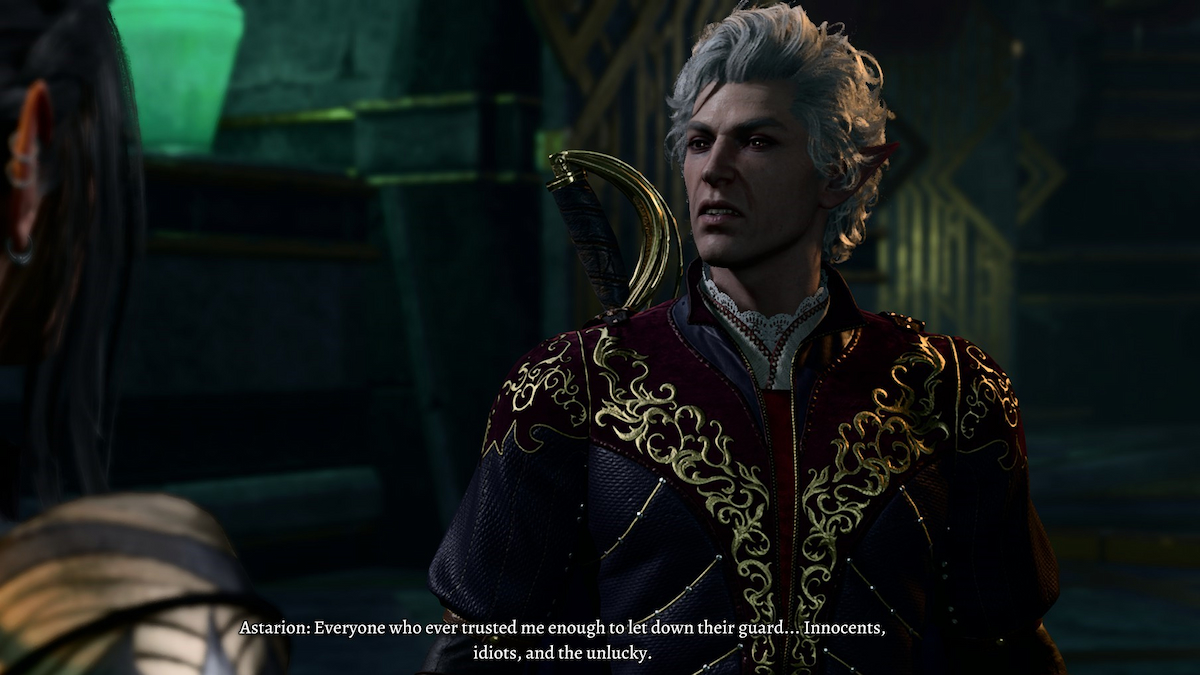
What & Who Influenced Astarion’s Character
When Newbon was first becoming acquainted with Astarion and began forming his personal interpretation of the role, some of his muses included a well-known comedic stock character, friends, and a rather mercurial cat.
“I have a background in commedia dell’arte. There’s a character in there called Arlecchino, an amoral jester who’s a harlequin, basically. There’s lots of these lovely movements, like this,” he said, raising his hands to shoulder height and pivoting his wrists in a series of theatrical yet delicate gestures, “and he sort of does these little hops down and stuff,” he added, pressing his palms forward and miming landing nimbly from a height. “I used a lot of that in [Astarion].”
Astarion’s voice and mannerisms were based partly on three individuals: Giles Foreman, Leendert Van Nimwegen, and Reuben Kaye. “I stole things from people I love dearly,” Newbon said, grinning widely. To illustrate one example, he slid into a distinctly Astarion-esque posture — shoulders turned to the side, chin raised, lips slightly pursed — and let out a heavy sigh coupled with a dramatic sidelong glance. “That is literally one of my one of my closest friends; I stole that from him! If you don’t know my friend really well, you’re not entirely sure what to do with that because he’s not telling you to go away, he’s not dismissing you, but it’s definitely a putdown without words. It’s beautiful.”
Related: How to Help a Downed Teammate in Baldur’s Gate 3
Additionally, Newbon has a feline acquaintance who inspired Astarion’s general demeanor. “There’s a stray cat that hangs around my garden, and he’s awesome. He’s been around this area about 20 years apparently, or something crazy like that,” he said. “He’s a very cool cat, but it took me three years before he’d stopped ripping my arms to shreds and biting me. It took me three years of just being cool with the cat. He’s really old now, but yeah, he had this interesting vibe about him. I thought, ‘I wonder if I can steal things from this cat.’ The way the cat moves, or the way the cat looks at you. The way the cat will allow you to come closer and then rip your hand off when it’s bored ‘cause that’s enough. ‘That’s enough, now. No touching now, darling.’ You know, things like that.”
Coincidentally, my cat chose this moment to throw himself at my office door and let out a long, pitiful meow to express his displeasure at being barred from the room. “Oh, you can let him in! I don’t mind!” Newbon said graciously, but as this particular cat has been known to send emails and turn off the computer without my permission, I regretfully had to decline.
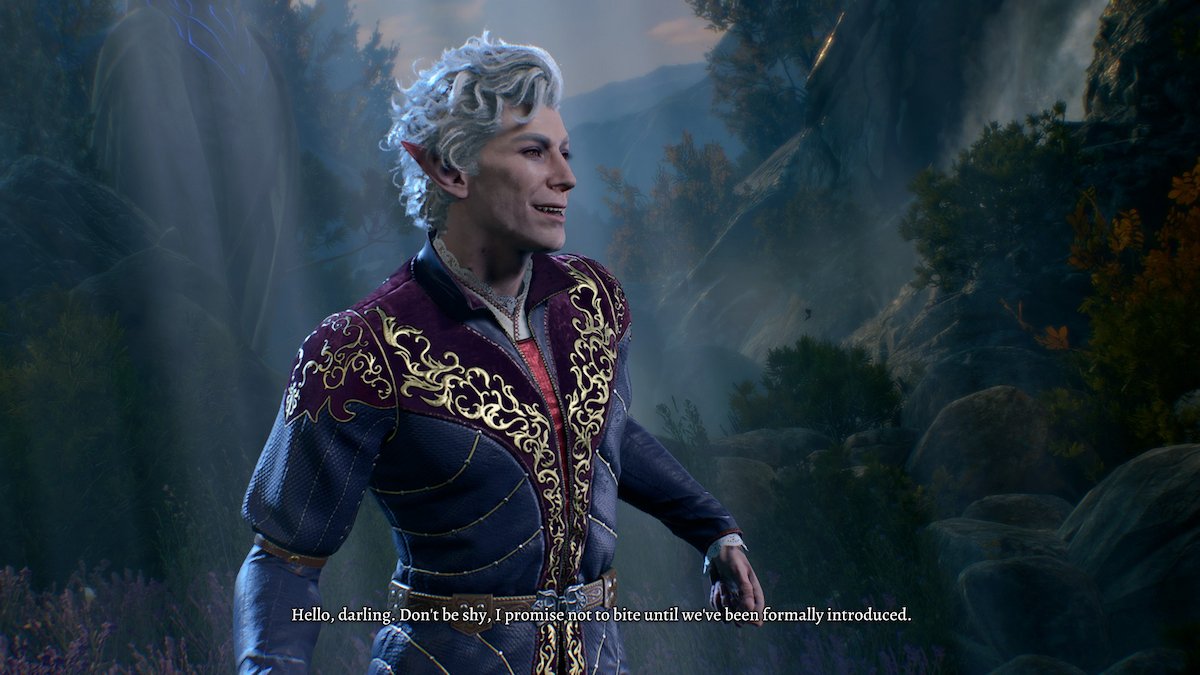
How Newbon Got Into Character for Astarion in Baldur’s Gate 3
According to Stephen Rooney, Astarion’s writer, one useful technique for getting into the headspace of a character he’s drafting is to imagine conducting an interview with the character and write down their responses to begin establishing their conversational voice. I asked Newbon if he has any similar strategies for immersing himself in a new role.
“The interesting thing about exploring a new character is you’re not entirely sure what’s going to work until you just start playing around,” he said. “For instance, I have this Spotify list, which I use often to set the tone for myself as an actor before I step into the volume. It’s usually very specific, and if you look at it, it may not make any sense. I have Morecambe & Wise’s ‘Bring Me Sunshine,’ for instance, which is a very strange song to have on a playlist for Astarion…but it makes sense to me!”
Newbon also spoke about how his background as a Method actor enabled him to cultivate aspects of Astarion’s behavior in a more organic way. “I started trying to live his life…well, I don’t mean I was walking around London and Los Angeles trying to bite people or manipulate them! What I mean is that, in the privacy of the studio or my own home, when I’m looking at the text, I’m going to start playing around with the physicality,” he said. “The intellectualization of the character comes at the beginning, and then eventually at some point you let go of the intellectualization and you just start doing.”
Related: What Are Soul Coins in Baldur’s Gate 3
This approach is much easier to describe than to put into practice, of course. Newbon has honed his craft for decades, studying Method, Meisner, clowning, ape work, and other disciplines in order to expand his arsenal of acting techniques. “When you try acting, you start seeing what looks to be effortless on [the audience’s] side actually takes a lot of work on the actor’s side, but that’s the goal: to make it look effortless. Most of the rehearsal work you don’t see because you’re not supposed to. You’re supposed to see that point of presence in the moment; the tip of the iceberg,” he said, making a triangle with his thumbs and index fingers. “All the stuff down here,” he continued, motioning to the larger triangle formed by his upraised arms, “is really for the actor. We have to make it look seamless, because otherwise you don’t believe it. You can see the acting coming through.”
One crucial and sometimes overlooked aspect of acting is knowing how to separate a character from one’s personal life. “With Method and with all these other wonderful tools in acting, there is a danger of losing yourself a little bit in the role,” Newbon explained. “I always leave on a high after finishing a session. I’m always full of adrenaline, full of creativity. I usually have to decompress for a few hours to get down from the energy, and a big part of that is to let go of the character. ‘Cause it’s not your life, it’s their life that you’re a caretaker of for the moments that you’re working with them — abstractly — to create their journey. You have to leave them in the same way that you have to leave your personal life, to some extent, at the door when you’re working.”
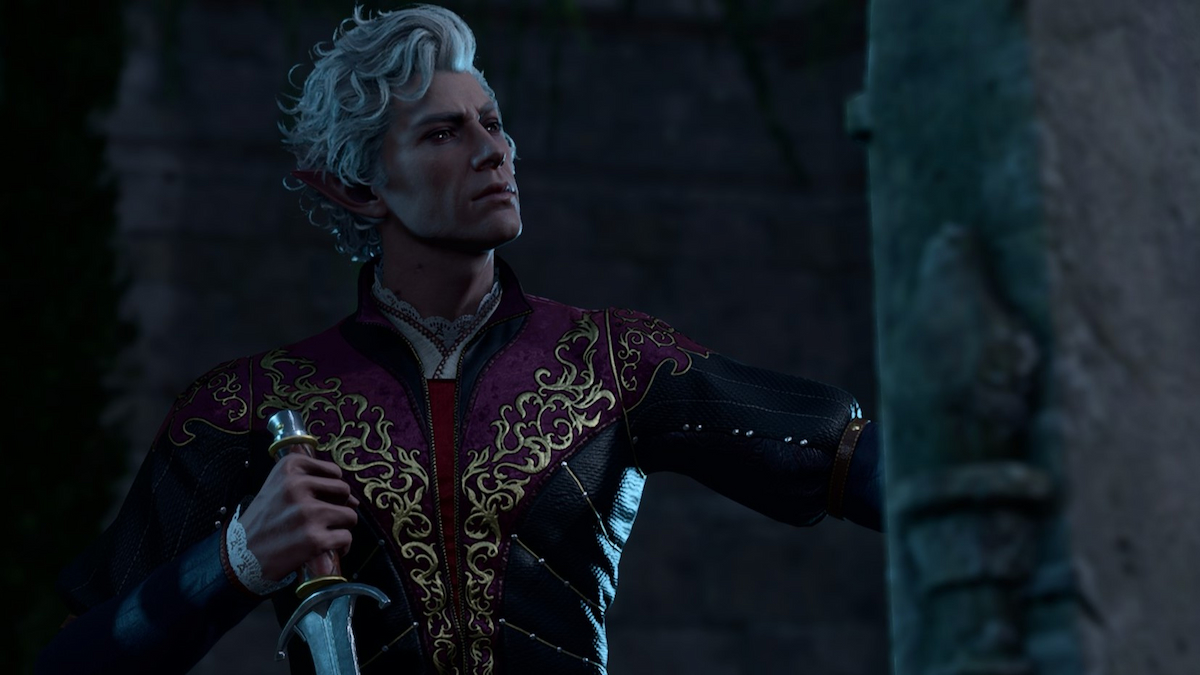
How Newbon Felt About Working With Larian Studios
Newbon spoke very highly of the writers who contributed to Baldur’s Gate 3, specifically Stephen Rooney, with whom he worked closely over the course of the game’s development. “Stephen and I know each other through the game and have become friends through it. I’m a huge admirer of Steven; I think he is such a wonderfully talented writer,” said Newbon. “His writing never fails to move me or make me laugh outrageously loud, and I’ve just had so much fun playing with his words. He deserves a spotlight on him for his stuff, as do all the writers, because all of the writing is amazing.”
For Newbon, the collaborative process at Larian was both productive and immensely rewarding. “From what I understand, [Rooney] started writing a little bit towards my rhythm because I latched onto his rhythm and started playing with it in interesting ways, and he liked it. He said he didn’t expect certain lines to come out the way they did. So, he picked up on a few things that I was doing, and he played into that a bit. Then, I would follow his new rhythm and play with that,” he explained. “It was this wonderful symbiotic relationship — playing with the writer and with the directors together in the volume, whether they’re present or not physically, and just seeing where you can take [the performance] whilst still keeping the story going in the way that the writer intends and the way the overall vision is.”
I asked Newbon which lines of dialogue were most memorable or fun to record, but there were simply too many excellent options to choose from. “All of them, all of them! I don’t have a favorite because they’re all so incredibly good,” he said. He did, however, express a particular fondness for lines that called for an abrupt tonal shift partway through (for example, ‘Of course, what fun…I’m going to fucking kill you’) and dialogue that occurs in some of the game’s more uncommon scenarios. “There are just so many great one-liners, especially some of the ones that people will never see unless they do a very specific thing,” he said.
He continued, “There’s one thing that if [Astarion] dies in such a way, and you bring him back in such a way, you get access to certain lines of dialogue. But unless you do these two things very specifically, you will never hear that. There’s so much of that in the game. I think it’s really interesting that Larian has made such a great commitment to all possibilities regardless of how you play, and to support that with dialogue is very cool.”
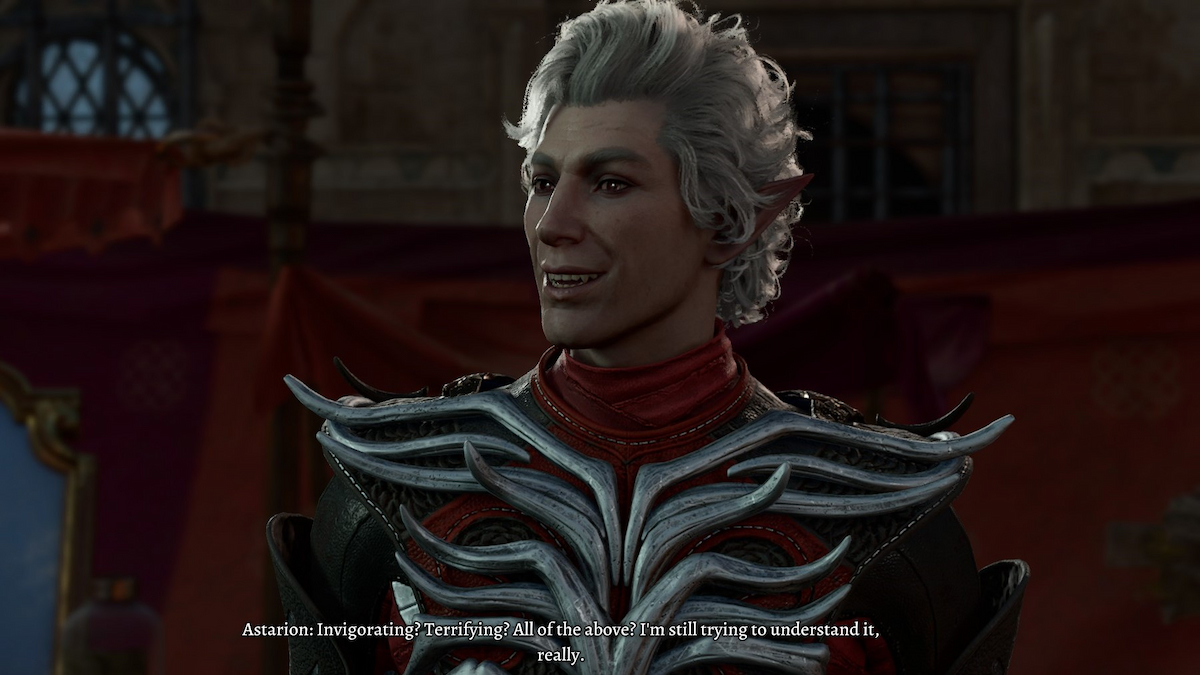
Astarion Is More Than Just a Pretty Face in Baldur’s Gate 3
Despite being the source of many of Baldur’s Gate 3’s more lighthearted and comedic moments, Astarion also has several heavy themes at the center of his narrative — agency and consent, the cyclical nature of abuse, and intimacy-related trauma, just to name a few. Although such subject matter can be emotionally taxing to work with, it made the role all the more rewarding for Newbon. “I like challenging characters. Nothing good should be completely easy, you know? I always think that a little bit of struggle is what makes it a craft and what makes it so worthwhile,” he said.
Newbon believes that most players can relate to Astarion’s story in some way, and we discussed a few elements that he personally empathizes with. “There’s a lot about [Astarion’s] life that resonates with me,” he said. “A big part of that is his overriding sense to be free; to be who he wants to be; to have the life that he wants to have. That definitely resonates with me a lot because being an actor, I spent a good portion of my career broke. Actually, that’s how I got into games: I was just penniless and sick to death of not getting interesting jobs in film and TV. Not that I’m owed it… just because I was working so hard to try and get them. And then games came along and just offered me this amazing opportunity, and I was lucky to have people champion me from the very beginning. So, the sense of freedom and sense of developing a life that he wants.”
Related: Should You Join the Goblins or Save the Grove in Baldur’s Gate 3 (BG3)
He continued, “His trauma definitely resonates with me, for sure. Also, just seeing how you can be judged by what you look like, not being taken seriously, and being objectified in a way that is not fair.”
While we were on the subject of emotional moments in Astarion’s character arc, Newbon recalled the experience of recording one climactic scene. “In the good…well, not exactly good, but non-evil ending of [Astarion’s] story, there’s one bit that is a flow of about 20 lines or something like that, and we did it in one take!” he said. “Spoiler alert — it was everything from the bit where [Astarion] drags Cazador out of the coffin and then kills him but doesn’t ascend. It was a really fascinating experience. We did two passes because we have to have a safety, but they used the first take as it was, I think. Thomas Mitchells, I believe, was the director of that. It was amazing; that was a really incredible day.”
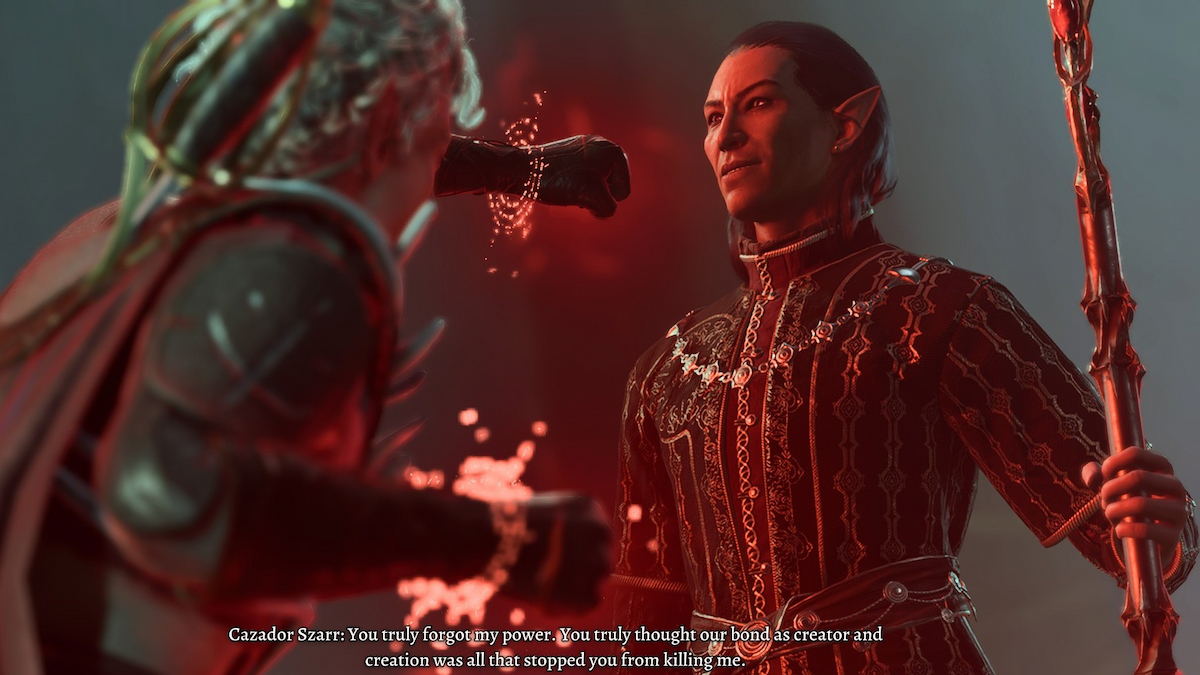
Newbon’s Reaction to Baldur’s Gate 3
Newbon is currently working on his own playthrough of Baldur’s Gate 3, often streaming the adventures of Bow’ee, his half-elf druid character. One of the main things he admires about the game from a player’s perspective is its treatment of mature content and romantic relationships. “It’s just really cool to see adult themes being treated in a very honest way,” he said. “For instance, you can have sex with somebody pretty much straight away, but that isn’t the actual story. It’s like, ‘Yeah, you’ve had sex, but now what? What is the relationship now? What does that person mean to you? Do they feel the same way about you? Are you actually going to be there for them? Are you going to sacrifice something for them? Are they going sacrifice something for you?’ It becomes incredibly interesting and real; it’s a very adult story in that way.”
He also applauded how the game forces players to face the consequences of their actions in the context of these relationships. “They don’t pull punches. If you upset somebody, they’re not going to just go, ‘Well, you’re the player character, and the quest needs to carry on. Therefore, we’ll just gloss over that bit.’ They might leave, and the story will carry on without them. I really like that aspect of the game.”
Newbon also talked about his love for branching narrative games in particular, reflecting on how their scope, quality, and popularity have increased over time. “It’s such a beautiful experience to be working in games,” he said. “Historically, the narrative thing was often tacked on. It wasn’t at the forefront of the experience; it was something that went along with it. Now, palates are changing, software is changing, and performances can be more nuanced. Now, we see the writing as equal to the gameplay in many games. People want that, and if it’s lacking, you get this experience of a great game that has no real soul. So, to be a part of a game where the narrative is equal to the gameplay itself, and where both are brilliantly executed…it’s so imaginative. It’s the richest experience for an actor because we get to really do our job. As opposed to having to make a character a bit more caricatured, cliched, or a bit more…sort of general, you know? We actually get to really live and breathe these characters.”
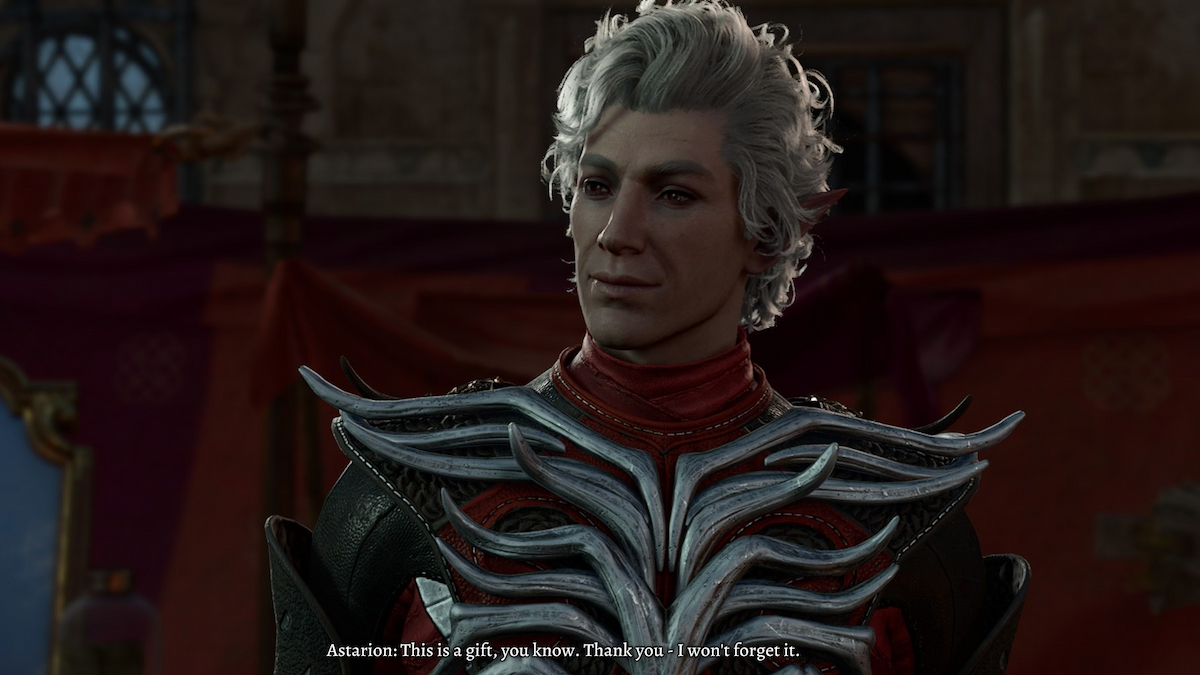
Final Thoughts
Though it’s been a couple of months since Baldur’s Gate 3’s release, Newbon is still overflowing with excitement, admiration, and appreciation toward everyone who made the game possible. “I am and will always be truly grateful to Josh Weeden, Jason Latino, Swen [Vincke], and all at Larian for asking me to dance in Astarion’s boots,” he said. “It’s been the honor of a lifetime and career, and I will always be grateful for this opportunity.”
